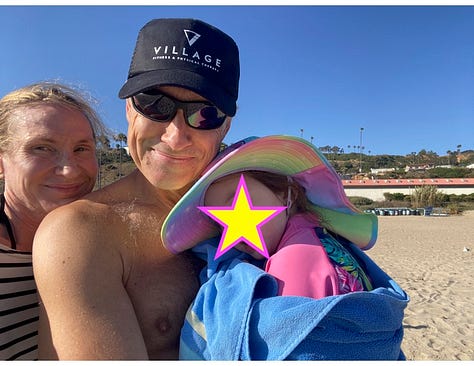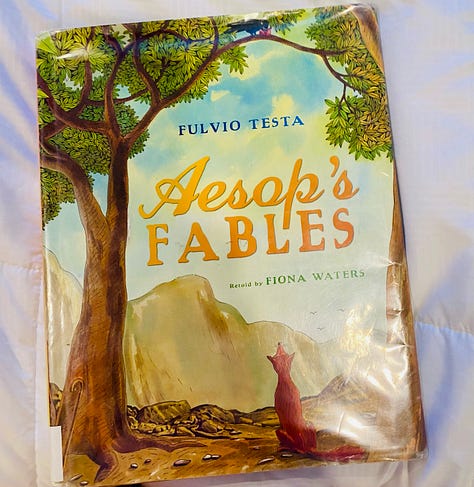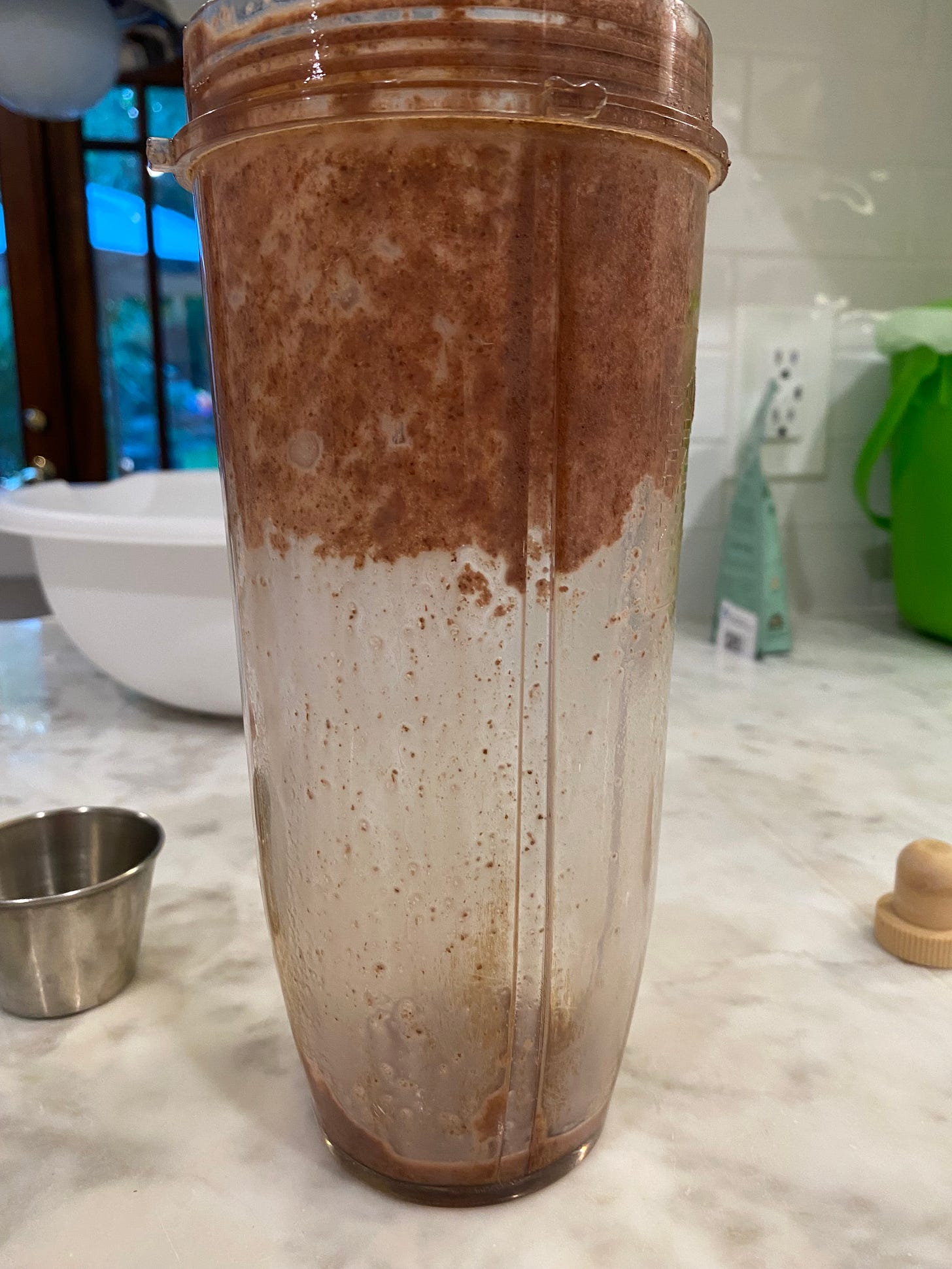REVIVING OCTOBER
Our first official newsletter!
CONTENTS
· What’s reviving us?
· Quote & Question
· Perspective Corner
· New Study Alert
What’s reviving us this month?
Launching this new channel! It is breathing fresh air into our lungs. Like a defibrillator on our brains, we are vibrating with electricity and our blood is in full flow.






Age (in)Appropriate is about the freedom to age in your own, unique way without being “should on”, shamed, blamed, ridiculed or restricting choice. Whether your choice is to hack it (Dave Asprey), hide it (cosmetic procedures), stop it (Bryan Johnson), solve it (David Sinclair), or simply manage it to the best of your ability (most of us). Here, we are free to age our way—looking, doing, being, learning, growing however we choose.
We’d love to make us all feel safe. Invincible. Immortal. Thank goodness someone knows what to do about this aging thing, right?! To be clear from the get-go, NO ONE KNOWS ANYTHING FOR CERTAIN. Especially us. We have no one right answer to any situation, issue or aspiration.
Our intention is to entertain, inform, inspire (and figure it out together).
Your epigenetics (AKA your lifestyle, your situation, your environment, your choices and their influence on how chemicals attach to your genes and effect their expression) are as unique and different as our genomes (AKA our original genetic instruction manual). The bell curve methods in medicine and healthcare must make way for individualized, precision information, recommendations, treatments and procedures. One size fits all is not working. What works for one of us might not work for you for any number of reasons, some easily recognizable, some unknowable at this time.
What we do have are questions and possibilities and perspectives—our own, our podcast guests and our film subjects. Our mandate is to question stereotypes, shake up the status quo, examine assumptions and adjust attitudes in order to discover actionable insights, adapt and reveal alternative paths forward in an age-positive, AGE (in)APPROPRIATE way.
Quote & Question of the Month
“Questions are the lifeblood of all progress. They provide the energy for transformation. Answers are resting places that protect the status quo.” —Dr Jeffrey Gladden, MD, FACC
Answers are always changing. When we had finally figured out the answer to one of our newborn’s particular cries, she stopped making it and an unfamiliar sound emerged from her tiny lips. We were stumped. The answer we had worked so hard to discover no longer worked. We had to pivot. We had to begin all over again asking questions to figure out what she needed.
When the answer for something stops working, we have to let go of that answer. No matter how much we love it. It might have always worked but that was in the past. It no longer works in the present. That is when we have to start asking new questions to discover new answers to what will work for us now.
Questions enable us to keep growing, transforming and adapting as the future arrives in twists, turns and unexpected bursts.
QUESTIONING OCTOBER
The first question of our first official newsletter is a question, not to get answers but, to discover more questions!
ASK YOURSELF: What question(s) can I ask myself that will help to ignite my mind, energy and jump start a mental transformation in the direction of my aspirations (in health, work, career, family, parenting, retirement)?
MAKE A LIST of the questions that pop into your mind. No matter how tiny, huge, random, ridiculous or absolutely impossible the question might seem or feel to actually answer. Keep digging into the questions until you find the one that resonates and feels the most pressing to launch your Age (in)Appropriate journey from. Here are some examples to get you noodling on questions that fit your situation, aspiration and life:
What do I want to do/heal/create?
Where am I stuck?
How can I adapt? (to feel, sleep, hear, move, heal, connect, create better-stronger-more)?
If nothing pops up for you right away, start with open ended questions and see if anything surfaces to fill in the blank space:
What if_________________?
Why not____________?
How could I___________?
WRITE DOWN the one question that resonates the most with you and best encapsulates what you want to examine right now. Launch from a place of exploration and curiosity. Not knowing the answer is the point.
Feeling confused, nervous or your mind is still blanking? We’ll give it a go first…
PERSPECTIVE CORNER
At 9:08am I pull out our two smoothie blender cups, one a 32 ounce size, one a 24 ounce size, in preparation for making my husband’s and my breakfast. My daughter watches from the banquet table. (I generally wait to make our protein shakes until she is awake because our blender is ridiculously loud, and we are in a small living space. Plus, we like to have breakfast together as a family every morning.)
She says, “Mama, I have an idea.”
“I’m listening,” I reply and turn away from the cups to face her.
“Make your shake in the smaller one so you can drink it faster.”
Where did that come from?! The backstory to this moment: I make myself a smoothie every morning that includes over 60 grams of protein and 30 grams of fiber. A girl’s gotta go and build muscle. This shake is colossal. It’s so big, it often takes me hours to drink. Sometimes, I don’t end up drinking it all because it turns to a sludge-like cement I can’t choke down. And I am always saying to my daughter, “once I finish my shake, we’ll do x, y or z.” Or “just let mama finish her shake then we can….” This is a daily occurrence and apparently, it has NOT gone unnoticed by my almost five year old.
“If you use the smaller cup, mama, you’ll drink it faster and drink all of it.”
Out of the mouths of babes as they say! Such a simple solution for an annoying problem. She’s always waiting on me to finish that darn smoothie before I am truly free from it and can fully focus and play with her! Of course, it is more complicated than that for me. I’d get less protein and less fiber if the shake was smaller. Would I ever actually make a second drink or eat more food to get the rest of my protein and fiber in? Would it compromise my nutrition to cut back on the size? Am I using it as an excuse to do other things like sneak in answering emails or texts? Why is that?! That is a rabbit hole for me to go down another time.
Where I’m going is she pointed out something I wasn’t even aware of and that had become a daily ritual for me. Wild. And clearly such an annoying one she figured out a solution to solve the problem! Beautiful simplicity. Other people see things we don’t. Especially young children!
If we open our ears and minds and listen, we might just learn something about ourselves. Bring on the smaller smoothie! Who knows what shaking up my protein shake routine will do for me? I’ll keep you posted.
With love and a new perspective on smoothie sizes,
—KJB
NEW STUDY ALERT
“Implausibility of radical life extension in humans in the twenty-first century”
At first blush this study, published on October 7, 2024, in Nature Aging from the renowned and highly respected aging researcher S. Jay Olshansky (and Bradley J. Wilcox, Lloyd Demetrius & Hiram Beltrán-Sánchezis)1 is a tad depressing for those in the “don’t die” and “live forever” camps.
To me, in the more pedestrian “age-positive” camp, it’s a really big “good to know.” Also, it’s a battle cry and a reminder to keep fighting for new discoveries and continue tending to our precious health and functionality gardens with what we have available to us to improve our lives in the here and now. And yes, also to possibly extend our lives down the road when the next longevity boom begins.
“More than three decades have passed since predictions were made about the upper limits to human longevity. Evidence presented here based on observed mortality trends in the world’s eight longest-lived populations and in Hong Kong and the United States, and metrics of life table entropy, indicate that it has become progressively more difficult to increase life expectancy.”
Let me explain how they define “radical life extension.” No, it’s not living to 1000 years old. It’s upping the average lifespan by only three years a decade. THREE YEARS. That’s not exactly an earth shattering addition there, folks.
“…3 years of life added per decade during the twentieth century (referred to a ‘radical life extension’).”
However, if you do the math, it does get a bit more exciting. Add that up over an average lifespan of 74.8 years for men and 80.2 for women in the United States2 and you could be looking at an additional 21 to 24 years of continuing to live after the end of your average. 20 extra years is enough time to start a new career and enjoy it for a decade!
But the study’s point is, that has NOT happened since 1990. In other words, we’ve hit a longevity plateau. There is a lot of work and investment happening to change that. Only time will tell. So, let’s all do our best to lengthen our health spans so we can find out if radical life extension actually becomes a real thing in another 30 years.
Until next month, we wish you a Healthy, Happy Age!
With love and gratitude,
—Kelli & Tim
Nature Aging: https://www.nature.com/articles/s43587-024-00702-3#citeas
Mortality in the United States, 2022: https://www.cdc.gov/nchs/products/databriefs/db492.htm






I love your new newsletter. I'm a big believer in living in and asking the big (and small) questions, and as I age it's the most wisdom-ish place to be, in the questions. "Age (in) Appropriate" has so many delicious connotations. I look forward to all you're creating for us on your channel.